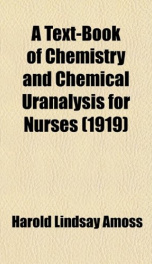a text book of chemistry and chemical uranalysis for nurses

Purchase of this book includes free trial access to www.million-books.com where you can read more than a million books for free. This is an OCR edition with typos. Excerpt from book: CHAPTER IV. MOLECULES AND ATOMS. The smallest particle of a compound which can exist is called a molecule. They vary in size, but are inconceivably small. Since compounds are made up of two or more elements, then molecules may be still further divided into atoms, which according to Dalton's theory are the indivisible particles of which all substances are composed. If we take FeO as an example, the smallest particle of FeO which can exist is a molecule, and this molecule .consists of an Fe atom and an O atom, which are indivisible. Generally atoms do not exist alone but only in combination, that is to say an element like oxygen, for example, consists of molecules of oxygen each of which is composed of two atoms of oxygen. We do not have then simply O in the air, but O2, for when an atom of O has no Fe or Cu or other element to combine with, it unites with another atom of O making O2. The size of an atom is so small that it cannot be determined or even imagined. We know that certain substances give off odors for long periods of time and never diminish in weight. In an attempt to convey some idea as to the size of these minute, infinitesimal particles, Lord Kelvin says: "Imagine a rain dropor a globe of glass as large as a pea, to be magnified up to the size of the earth; each constituent being magnified in the same proportion. The magnified structure would be coarser grained than a heap of small shot, but probably less coarse grained than a heap of cricket balls." Can Matter be Destroyed?In our experiments with limestone, we certainly changed this chemical compound and reduced its weight by heating. It was found that we drove off a gas and left a white friable substance that would unite with water and in the process would still further suffer chemical and physical changes...
Info about the book
Author:
Series:
Unknown
ISBN:
1130764680
Rating:
4.5/5 (2)Your rating:
0/5
Languge:
English
Users who have this book
Users who want this book
What readers are saying
What do you think? Write your own comment on this book!
write a commentif you like a text book of chemistry and chemical uranalysis for nurses try:
Do you want to read a book that interests you? It’s EASY!
Create an account and send a request for reading to other users on the Webpage of the book!


